Fred Meyer had a big sale on pineapple a couple months ago. They were $1 a piece and of course I stocked up. Fresh pineapple is fricken awesome and I made a HUGE batch of pineapple jam.
I'm always up for trying new food projects and after reading a copy of Wild Fermentation I decided I really needed to try pineapple vinegar from the huge amount of pineapple scraps I had. Of course I didn't use all the scraps I had, but I did this on a large scale, making almost 2 1/2 gallons.
I didn't quite follow the Wild Fermentation book to the letter, nor did I really follow any specific directions. After looking at a lot of slight different "recipes" online I just went with the general summation I mentally made. The variations were pretty wide, ranging from one pineapple skin good for one quart to one skin good for a gallon. The amount of brown sugar seemed reasonably static around 1/4 cup per pineapple skin.
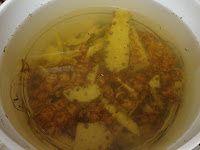 brown sugar per pineapple skin. Due to the variation of my source recipes I really wasn't shooting for a specific amount of skins. I just kept going until the bucket was about 2/3 full. The fun part was mixing the brown sugar in with my hands.
brown sugar per pineapple skin. Due to the variation of my source recipes I really wasn't shooting for a specific amount of skins. I just kept going until the bucket was about 2/3 full. The fun part was mixing the brown sugar in with my hands.Once this was done I simply filled the bucket up to about the 4 gallon mark with fresh, clean water. I didn't use tap water but instead opted for the cheaper bottled water from the store's Glacier machine. At 35¢ a gallon it is just easier to use it instead
of tap water, but if I had access to well-water I think I'd give that a go.
After filling the bucket I just capped it off with a piece of fabric held in place with a bungee cord. I didn't use just any old fabric, but a nice cotton weave that had small holes. I was looking for some meshing, but this was finer than that and quite sturdy. The bungee cord gave just enough tension to be easy to take on an off while still making the fabric tight against the lip of the bucket. A quick pull on the corners of the fabric and there was no way any fruit flies were going to get into that bucket!
This bucket was set on a shelf in my mini pantry that is right next to a window that is open whenever it is cool enough outside, which is about 16 hours a day. For the next two weeks I gave the mixture a stir every other day, making sure to check for any possible mold. I never did get any mold, but what I did get was an overwhelming smell of pineapple. Tucked away in the back corner it wasn't too bad unless you went out the back door. I'm sure we just got desensitized to it because whenever we had company they noticed it immediately.
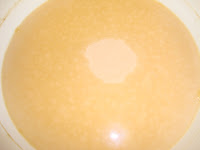 After a couple weeks I strained out the chunks of pineapple and fed them to my worms. The cover went back on and I let the mixture sit for a month....actually it sat for a bit longer because I didn't prepare to bottle the vinegar ahead of time. This process was relatively forgiving anyway. I managed to save some bottles, get some from friends, and even found some great ones at the recycling center before they were set to get smashed up to make new glass.
After a couple weeks I strained out the chunks of pineapple and fed them to my worms. The cover went back on and I let the mixture sit for a month....actually it sat for a bit longer because I didn't prepare to bottle the vinegar ahead of time. This process was relatively forgiving anyway. I managed to save some bottles, get some from friends, and even found some great ones at the recycling center before they were set to get smashed up to make new glass.I removed all the labels and washed everything several times. Since I didn't know how many bottles I'd need I just made sure I had "plenty" ready to go.
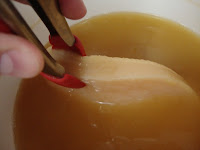 Uncovering my vinegar for the last time I was happy to find a rather healthy mother floating on top.
Uncovering my vinegar for the last time I was happy to find a rather healthy mother floating on top.There wasn't much expired mother in the bottom. What really surprised me was just how much mother there really was. This one layer of my mother was about 1' thick! It was pretty solid and it was easy to pull it out in one big piece. I ended up tearing it into large chunks and putting it into a 1/2 gallon canning jar. Later I put it in a bigger jar with a bit of reserved raw vinegar. Now I just need to figure out what to do with this mother.
Initially I strained the vinegar into another 1/2 gallon canning jar. I did this to guesstimate how many
bottles I'd need to sanitize. Luckily I had collected enough bottles that I could pick and choose which ones to use.
I was going to use my dishwasher to sanitize the bottles, but ended up just sanitizing them in the sink. You can use bleach (a Tablespoon per gallon) or better yet, get some sanitizer from your local brew shop. They have some of the best toys. While you are there you might want to get some PH testing strips. In general you can use this vinegar for anything you'd use vinegar for, but canning purposes really need stronger stuff. If your vinegar is too strong you may end up wanting to water it down to 5%. Mine came in a bit under 4.5%.
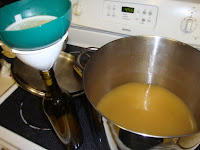 |
| Can you tell my ladle fell into the pot? |
 |
| Eight bottles of Pineapple Vinegar |
All I had to do then was cap the jars and set them aside for a photo. I think I need to make some cool
labels for this as well, but I may just go with something super simple like a quick tag.
Even though I had filtered the vinegar twice there is still a decent amount of sediment piling up on the bottom of the jars. Since the vinegar is still quite sharp I figure the rest of the sediment will have time to work its way down as the jars age. I'm thinking in a couple of months it might be quite good. I plan on just stirring everything up as I use it. The sediment is most likely the fine bits of mother I killed when I pasteurized the raw vinegar.
I'm planning on making some malt vinegar next......
 |
| Added 2013.08.05 |

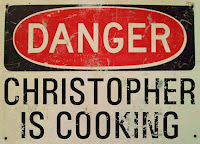

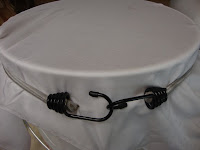

4 comments:
You are crazy, don't need to pasteurize it, it's a colony of probiotics!
Wow yours looks much better than my jars, and without all the fuss of weighing out everything like I did. Mine have been fermenting for a week now and I'm starting to get a white stringy material forming on the top of the exposed fruit (pieces are too small to stay completely submerged)which I'm guessing could be mold. I've been stirring and aereating every day but it doesn't go away. Should I toss it and start over with larger pieces that stay submerged or do you think I'm good to keep on going? No flies or anything though.
I'd just remove the moldy bits and keep going....at worst you end up throwing it out later.
The white stuff on top, if not fuzzy, is probably just kahm yeast. Not bad but, could compromise flavor some.
Post a Comment